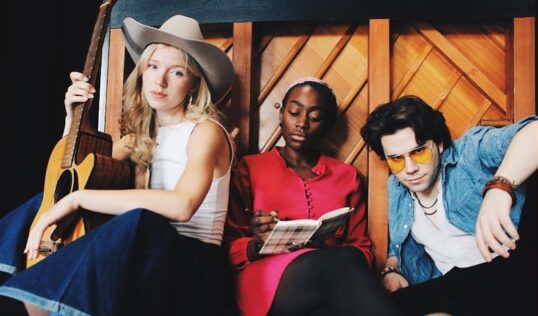As three musicians and their manager try to record a country-rock album overnight, things go drastically wrong.Summary
Rating
Excellent
It’s 1974 and in a cramped, dingy underground recording studio in London, musician Skye (Emily Moment) is recording with pianist Baron (Aveev Isaacson) watched over by manager Clarke (Nathaniel Brimmer-Beller). A red light bulb shines brightly, indicating they are taping a song, but just before it ends, Matilda (Hannah Omisore) bursts in.
Clarke has hired Black British songwriter Matilda to add some ‘soul’ to Skye’s album. He tells Skye, “You’re a goddess and everybody white already knows that, but you need a widespread appeal. Black charts are still charts and Ms Matilda here holds the key.” The play further explores institutional racism and white individuals appropriating elements from black culture.
As Matilda impresses Clarke and Baron with her songwriting and singing, Skye gets increasingly hostile and more racist towards her. In one moment, Skye moves Matilda’s microphone stand off the rug they share, a clear demonstration of asserting power. Yet, the pinnacle of this is when she proudly shows off her Confederate tattoo. Moment does a fantastic job of playing someone so abhorrent.
Throughout the first act, Skye is the most powerful person in the room. This is because if the group does not record the number of songs required by the label, they do not get paid. Skye holds sway as Matilda, Clarke and Baron depend on her voice. Therefore, she can say whatever she likes without any repercussions. Yet, in the last act, Skye’s singing role is reduced and symbolically this diminishes her power.
The final twenty minutes of the play are the most tense. The toxic fireproofing binding agent in the recording studio’s walls is slowly causing madness among those inside. To signify this, in the last act, the studio set is chaotic, with mic stands knocked to the floor and sheet music scattered. The characters’ formerly neat 1970s costumes are now dishevelled and untidy. They present their dazed, groggy behaviour by stumbling around and falling over a lot, which feels a little excessive.
A couple of directorial choices are slightly misplaced. During poignant moments Omisore faces towards the back of the stage, away from the audience. I would have liked to have seen how she portrayed intense emotions in Matilda. Similarly, when Brimmer-Beller is lying in the corner by the door, the audience can’t discern the emotions he is conveying.
In Everglade Studio features country-rock music composed by Isaacson. Both Moment and Omisore have captivating voices and sing with conviction and passion, but at some points, the instruments were too loud and I found it difficult to hear them.
Brimmer-Beller’s approach to exploring and symbolising power dynamics through voice is clever and creative. Throughout the play, tensions gradually build, although the ending feels rather rushed. The claustrophobic setting amplifies these heightened emotions and the price for creativity is high.
Produced by Black Bat Productions
Written by: Nathaniel Brimmer-Beller
Directed by: Nathaniel Brimmer-Beller and Phoebe Rowell John
Composer and musical director: Aveev Isaacson
In Everglade Studio plays at The Hope Theatre until 4th May. Further information and booking can be found here.
 Everything Theatre Reviews, interviews and news for theatre lovers, London and beyond
Everything Theatre Reviews, interviews and news for theatre lovers, London and beyond



